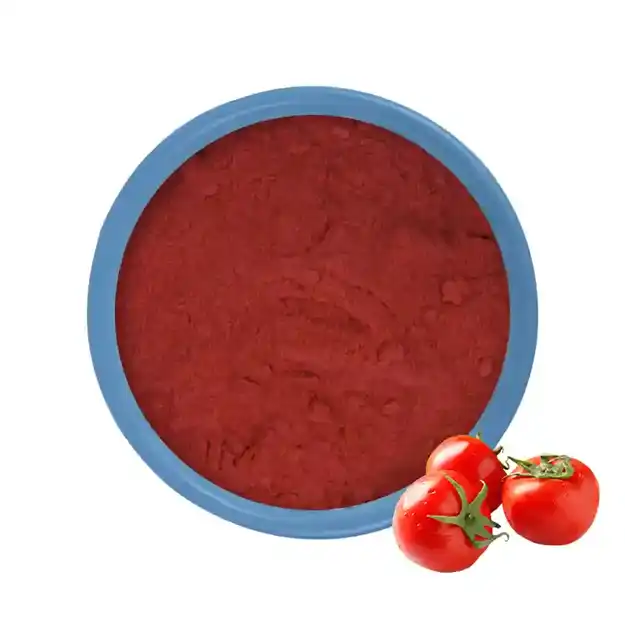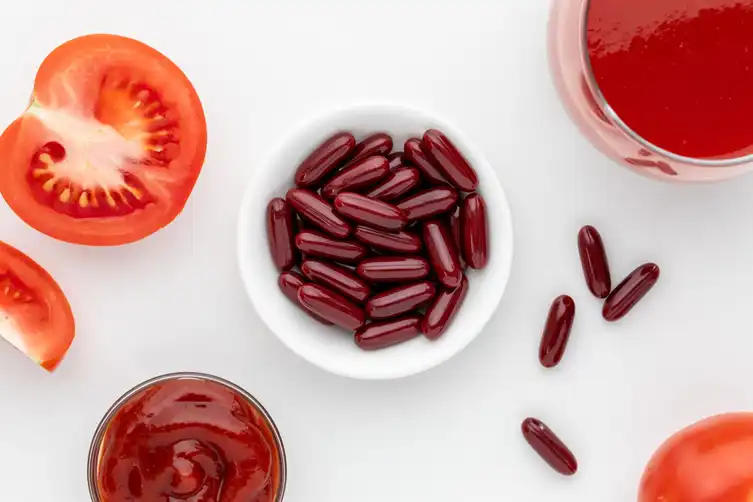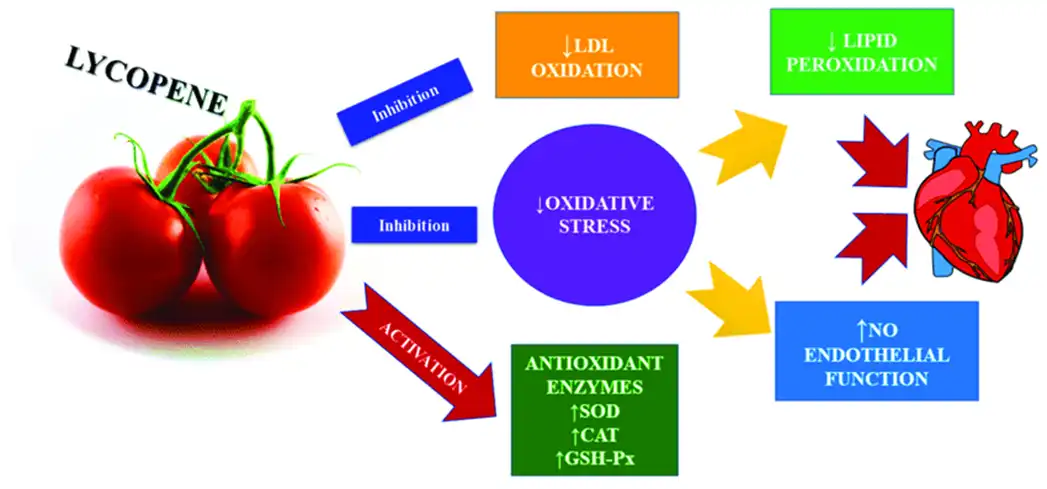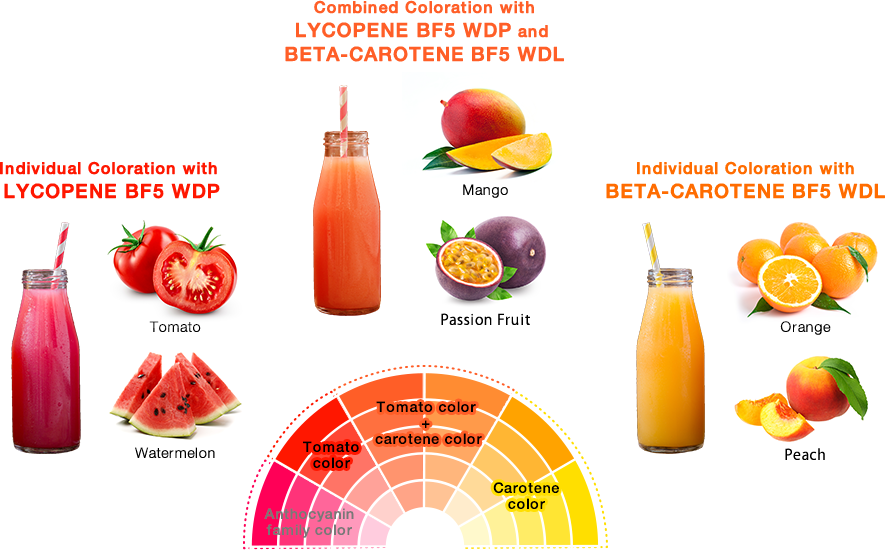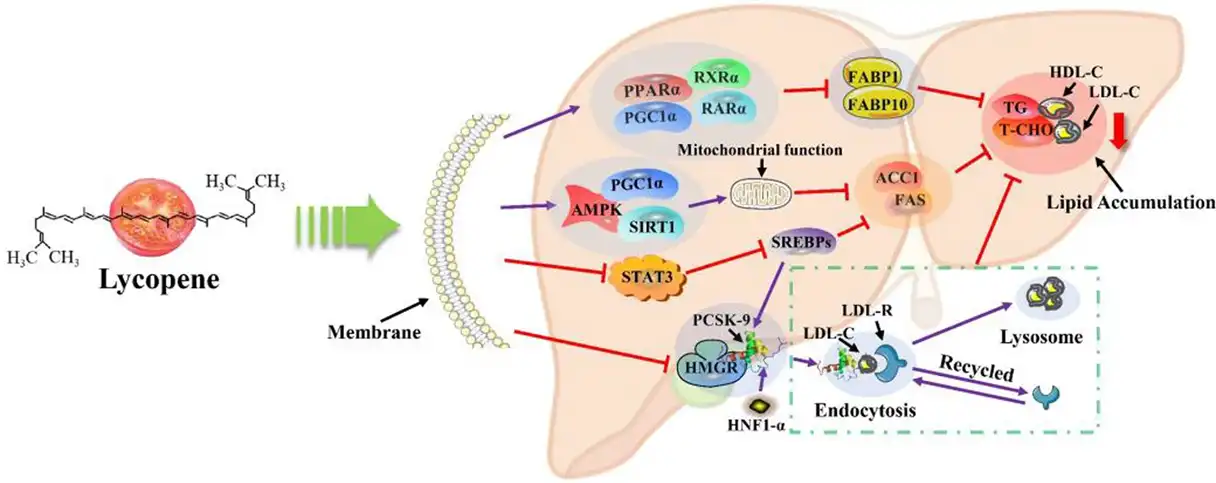What's Lycopene?
What is Lycopene?
Lycopene is a carotenoid − a natural pigment that gives some vegetables and fruits their red color. It is an antioxidant (a substance that protects against cell damage). Tomatoes provide about 80% of the lycopene in the US diet. Tomatoes processed with high heat contain lycopene in a form more usable by the body than in raw tomatoes; however, heat processing can destroy other nutrients such as beta-carotene, vitamin C, and vitamin E. These are also antioxidants. Synthetic lycopene is categorized as "generally recognized as safe" by the US Food and Drug Administration.
Yangge Biotech Lycopene powder nutrients are not originally created by the human body, but rather produced by plants as a defense against environmental damage, such as pests, toxins and UV damage. Instead of allowing free radicals to run free within the plant, it creates various types of phytonutrients to protect itself. lycopene is a fat-soluble nutrient, meaning it’s absorbed better when consumed alongside fats, such as avocados, olive oil or seeds. The food with the highest concentration of lycopene is the tomato, although it can be found in many other plant foods as well.
Lycopene: Structure Formula
From the perspective of chemical characteristics, Lycopene is an acyclic isomer of beta-carotene, that is, they have the same molecular formula but with the atoms positioned differently. Specifically, the Lycopene molecule is characterized by a long chain of 40 carbon atoms (C40H56) with 11 conjugated and 2 unconjugated double bonds.
Lycopene molecules upon exposure to light, thermal energy or chemical reactions undergo the process of trans-cis isomerization. In nature it is found 90% in trans form, the thermodynamically most stable form, while in the human body it is mainly present in cis form, the most bioavailable form.
Lycopene concentration in fresh fruits and processed food products
|
Fruit/processed food product |
Lycopene content (mg/100 g) |
|
Apricot and fresh tomatoes |
0.11–5.3 |
|
Carrot |
0.65–0.78 |
|
Cooked tomatoes |
3.70 |
|
Fresh tomatoes |
0.72–4.2 |
|
Ketchup |
9.90-13.44 |
|
Papaya |
0.11–5.3 |
|
Pink grapefruit |
0.35–3.36 |
|
Pink guava |
5.23–5.5 |
|
Pumpkin |
0.38–0.46 |
|
Rosehip |
0.68–0.71 |
|
Sweet potato |
0.02–0.11 |
|
5.40–150 |
|
|
Tomato sauce |
6.20 |
|
Watermelon |
2.30–7.20 |
Applications
Nutraceuticals and Supplements:
- Antioxidant Benefits: Lycopene is a potent antioxidant, which helps in neutralizing free radicals in the body. It’s often used in dietary supplements to support overall health, particularly in reducing the risk of chronic diseases like heart disease and cancer.
- Prostate Health: Studies suggest that lycopene can help in maintaining prostate health and may reduce the risk of prostate cancer.
Food Industry:
- Natural Food Coloring: Lycopene is used as a natural colorant in the food industry, giving a red hue to various products like sauces, juices, and dairy products.
- Fortification: It's added to foods to enhance their nutritional value, particularly in functional foods aimed at promoting health.
Cosmetics:
- Anti-Aging: Due to its antioxidant properties, lycopene is included in skincare products to protect the skin from damage caused by UV rays and to reduce the appearance of wrinkles and fine lines.
- Skin Brightening: Lycopene is believed to improve skin tone and texture, making it a popular ingredient in various beauty products.
Pharmaceuticals:
- Cardiovascular Health: Lycopene has been studied for its potential in lowering blood pressure and improving cholesterol levels, making it beneficial in cardiovascular treatments.
- Cancer Prevention: Research indicates that lycopene might play a role in reducing the risk of certain cancers, such as those of the lung, stomach, and breast.
Agriculture:
- Plant Protection: Lycopene is being explored for its potential use in agricultural practices, such as enhancing the nutritional value of crops or using it as a bioactive compound for plant protection.
Lycopene Aquatic Environmental Benefits
Aquatic organisms are susceptible throughout their lives to chemical and physical stressors, which negatively affect their health. Various aquatic pollutants derived from industrial effluents, overuse of some agricultural pesticides, herbicides and insecticides may cause devastating toxicological aspects of aquatic organisms and deteriorate their health and growth. Therefore, the need for using natural antioxidants to be used as feed additives is of great importance to counteract the hazardous oxidative stress responses. Lycopene is the principal carotenoid pigment found in tomatoes and their products, vegetables and red fruits. Numerous studies have recommended the use of lycopene as a powerful antioxidant to attenuate the oxidative stress responses in several fish species exposed to various toxicants or any other stress conditions. Lycopene maintains the health condition of fish by enhancing the immune and antioxidative responses.
Physical properties of lycopene
|
Property |
Value/normal range |
|
Boiling point |
660.9°C at 760 mmHg |
|
Crystal form |
Long red needles separate from a mixture of carbon disulfide and ethanol |
|
Density |
0.889 gm/cm3 |
|
Flash point |
350.7°C |
|
Main hazards |
Combustible |
|
Melting point |
172–175°C |
|
Molecular weight |
536.85 Da |
|
Powder form |
Dark reddish-brown |
|
Refractive index |
1.531 |
|
Solubility |
Soluble in chloroform, hexane, benzene, carbon disulfide, acetone, petroleum, tetrahydrofuran, carbon disulfide, ether, and oil; insoluble in water, ethanol, and methanol |
|
Stability |
Sensitive to light, oxygen, high temperature, acids, catalyst, and metal ions |
|
Vapor pressure |
1.33·10−16 mmHg (25 |
Lycopene Benefits
1. One of the Most Powerful Antioxidants in the World
lycopene’s antioxidant capabilities can protect your body from the damage induced by pesticides. Studies show that it can protect your liver from common corruption by dichlorvos and also reverse or protect from destruction to your adrenal cortex by atrazine. Not only can lycopene help with infections, but its antioxidant properties even have been found to repair damage in the blood-spinal cord barrier in cases of spinal cord injury.
2. Helps Prevent Cancer
Scientists at the University of Portsmouth studied lycopene’s ability to slow the growth of breast and prostate cancer by interrupting signal pathways that would normally cause the tumors to grow more.
3. Keeps Your Eyes Healthy
Lycopene also protects your eyes from oxidative stress that causes common eye diseases, making it one of the stronger eye vitamins you can consume. By exhibiting both antioxidant and anti-inflammatory properties, lycopene slowed and/or stopped a long list of reactions within the cells of the eye that are caused by or lead to macular degeneration in a study out of Taiwan published in Life Sciences.
4. Alleviates Neuropathic Pain
lycopene expressed antinociceptive (pain-inhibiting) capabilities and lowered the overall body mass of the subjects in the study published in the European Journal of Pain. This research indicates that increased lycopene dietary intake has powerful potential to help alleviate the chronic pain those with neuropathy suffer.
5. Good for Your Brain
Lycopene also has compelling neurological benefits, and foods with it should be considered top brain foods. lycopene counteracts future cell damage and death in the brain by interacting with specific mitochondrial interactions that, left unchecked, allow the brain to continue to suffer constant degradation.
6. Improves Heart Health
lycopene also proves to be a tool in protecting the heart from a large number of common conditions. It’s one of the nutrients recommended for lowering high blood pressure levels. It prevents several cardiovascular diseases, such as coronary heart disease, myocardial ischemia (reduced blood flow to the heart caused by arterial blockages) and atherosclerosis.
7. Keeps Your Bones Strong
Lycopene also helps relieve oxidative stress in bones that cause brittle and weak bone structure. It slows the apoptosis (cell death) that causes bones to weaken and reinforces the cellular architecture of bones, keeping them healthier and stronger.
Other Potential Benefits`
Lycopene may also offer a range of other health benefits — the best-researched ones include:
· May help your eyesight: Lycopene may prevent or delay the formation of cataracts and reduce your risk of macular degeneration, the leading cause of blindness in older adults.
· May reduce pain: Lycopene may help reduce neuropathic pain, a type of pain caused by nerve and tissue damage.
· May protect your brain: Lycopene’s antioxidant properties may help prevent seizures and memory loss experienced in age-related diseases, such as Alzheimer’s.
· May contribute to stronger bones: Lycopene’s antioxidant action may slow down the death of bone cells, reinforce bone architecture and help keep bones.
Lycopene vs. Beta-Carotene
There are other carotenoids that are popular in research and health study. One such carotenoid is beta-carotene, and it has some similarities and some differences to lycopene that are important to note.
- Both are antioxidants.
- Beta-carotene is a precursor to vitamin A. Lycopene is not a precursor to any vitamins.
- Lycopene has not been proven to have lasting or permanently damaging side effects from overconsumption. Vitamin A from beta-carotene, however, is toxic, although this is only true in cases over-supplementation, not in dietary intake.
- When consumed dietarily, the body can filter out all unnecessary lycopene and beta-carotene.
- Both have anti-inflammatory and anti-cancer properties.
- Both protect against cognitive decline and eye disease.
- The highest concentration of lycopene can be found in tomatoes. In peppers, you’ll get the most beta-carotene per serving.
- Beta-carotene supplements can negatively interact with a number of medications, including statins, orlistat, some cholesterol-lowering drugs and mineral oil. Lycopene has potential complications when combined with blood thinners, fertility medications, nicotine and several other classes of dangerous drugs.
Nutrition facts
The water content of tomatoes is around 95%. The other 5% consists mainly of carbohydrates and fiber.
Here are the nutrients in a small (100-gram) raw tomato:
- Calories: 18
- Water: 95%
- Protein: 0.9 grams
- Carbs: 3.9 grams
- Sugar: 2.6 grams
- Fiber: 1.2 grams
- Fat: 0.2 grams
Carbs
Carbs comprise 4% of raw tomatoes, which amounts to fewer than 5 grams of carbs for a medium specimen (123 grams).
Simple sugars, such as glucose and fructose, make up almost 70% of the carb content.
Fiber
Tomatoes are a good source of fiber, providing about 1.5 grams per average-sized tomato.
Most of the fibers (87%) in tomatoes are insoluble, in the form of hemicellulose, cellulose, and lignin.
Conclusion
Lycopene is a powerful antioxidant that can protect and repair the body from damage caused by a multiple disease. You can get a great deal of it in your diet by consuming tomatoes, watermelon, and other common fruits and vegetables. One of the best ways to ensure your body absorbs the highest lycopene content possible is to add heat and healthy fats to tomatoes, such as making homemade tomato sauce for pasta. The change in lycopene molecules this causes (from linear to bent) can’t usually be found in commercially produced pasta sauce.
Where to Buy Lycopene?
You can purchase Lycopene at yanggebiotech.com. The company is an industry-leading manufacturer and distributor for pure dietary supplements. YANGGE BIOTECH INGREDIENTS is not just a consumer brand. It also supplies pure ingredients to other brands that distribute food and other supplement products. Contact us to place an order today.
Send Inquiry
Related Industry Knowledge
- Hydrolyzed Corn Protein: The Plant-Based Protein Powerhouse for Health and Wellness
- Exploring Resveratrol: Nature’s Superfood Antioxidant
- How long does it take for 5-HTP to start working?
- Mind and Body Benefits of Lions Mane Powder
- Cod Liver Oil: Benefits from Fish
- Better Skin with Bioactive Collagen Peptides
- Pure Collagen: Powder, Liquid, and Serum
- Sea Moss Benefits for Men
- Omega 3 epa vs dha
- Can I use almond flavor powder daily on my face?

